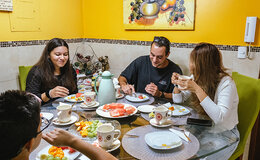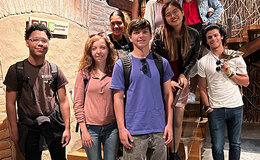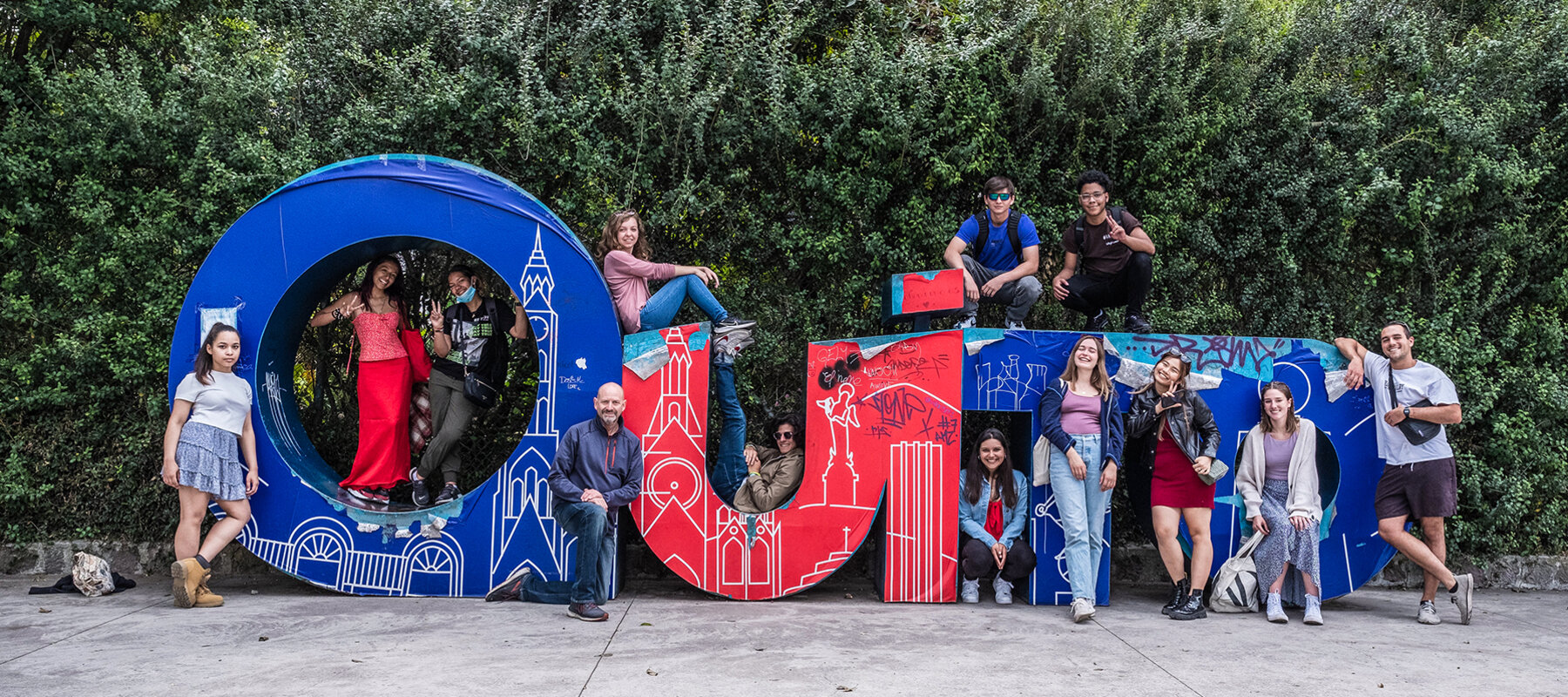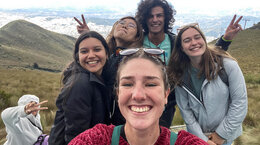Eleven first-year students from five U.S. states and Vietnam. Four courses. Fifteen weeks in Ecuador. All tied together by one thematic thread: adaptation.
This is Lehigh Launch Ecuador, a unique first semester for curious and independent-minded students, led by Lehigh faculty. The program is hosting its first cohort of students this year, after a two-year COVID delay.
Lehigh Launch Ecuador, the sister program to Lehigh Launch American West which began two years ago, is active and immersive – students live and learn together, with place at the center of the curriculum. The semester in the American West starts with a backpacking expedition in the Rocky Mountains, followed by classroom- and field-based learning in Wyoming and New Mexico. For the semester in Ecuador, students are based in the capital city of Quito. They visit a cloud forest and a research station in the Amazon rainforest, and then head to the Galapagos Islands for the final three weeks. They live in homestays with local families, which allows for cultural immersion and language practice. It’s run in partnership with IES Abroad.
The best part is that we get to see what we’re learning about in real life.
Common themes weave concepts together across the courses, field work and excursions. The faculty director of Lehigh Launch in Ecuador is David Casagrande, a professor of anthropology with a joint appointment with Lehigh’s Environmental Initiative. An ecological anthropologist who studies how culture shapes the way humans interact with natural environments, Casagrande chose “adaptation” as the common theme. He’s teaching an anthropology course that examines social change from the perspective of indigenous peoples and an integrative seminar on environmental issues in the country. The curriculum also includes courses in ecology and Spanish.
“I’m combining pedagogy with social theory – how people interact with environments – to give students a way of generating meaning out of this incredibly complicated, and sometimes emotionally reactive, experience,” Casagrande says. “How do you derive meaning from your experience? How do you develop good creative questions about it?”
Through the integrative seminar, Casagrande aims to help each student increase their capacity for creative inquiry, develop a deeper sense of place, and build emotional intelligence. In addition to academic exercises focused on analytical thinking and reflection, he Is incorporating techniques like mindfulness-based stress reduction. That’s because, he says, learning to be a global citizen is not an easy process.
For example, the first few weeks of the seminar focused on oil extraction in the Amazon. Students learned about complex issues like sustainable development and international economic policy. Then they traveled to the Ecuadorian Amazon to see for themselves. They spent several days at Tiputini Biodiversity Station, a research facility and conservation organization, and visited the village of Pompeyo to tour environmental damage caused by the petroleum industry.
“Essentially at this point, Ecuador has no choice but to destroy the Amazon to extract oil because that’s the way the system is set up,” Casagrande says. “When we went to the Amazon, we spent two days in this pristine area watching monkeys and then we spent a day and a half interviewing people who have cancer because there’s oil bubbling up out of their coffee plantations. How does an 18-year-old process something like that?”

Not All Classrooms Have Walls
The opportunity to explore issues from multiple perspectives and in a specific local context, learn to embrace contradiction and develop a sense of responsibility for others is part of what sets the Lehigh Launch experience apart.
Ashley Diaz ’26, a biology major from Indiana, knew she wanted to study abroad in college, so when she saw the option to apply to Lehigh Launch in Ecuador as part of her Lehigh application, she jumped at the chance.
“It’s an opportunity you just can’t pass up,” she says.
“I think it’s safe to say it’s been one of our best decisions so far,” adds Ally Hoang ’26, a computer science and business major from Vietnam and Diaz’s homestay housemate.
Diaz says that in addition to learning about adaptation in their courses, they’re using the concept to reflect on their experiences outside the classroom.
“I’m away from my parents for the first time,” she says. “I have to adapt to the city life and living on my own. I tend to be more introverted, so I’ve had to adapt to the cohort environment.”
Hoang says that the connections between each course, and between the courses and the field experiences, make for a different learning experience.
“The best part is that we get to see what we’re learning about in real life,” she says. “It helps so much because we can actually comprehend.”
Liz Matthews ’26, a neuroscience major from New Jersey, agrees.
“We’re learning about, for example, the concept of buen vivir,” she says, referring to the indigenous worldview that emphasizes community and harmony between humans and nature.
“So we learn about that in the classroom, but then we go to the Amazon rainforest and get to speak with indigenous people and see how they actually implement it in their lives.”

The First Semester Is Just the Beginning
The Launch students may not be in Bethlehem, but they’re still part of the Lehigh community. Casagrande is joined in Ecuador by David Caccavo ’22, a recent Lehigh graduate serving as the program assistant. His role includes helping mentor students, introducing them to campus culture and coordinating programming aligned with bLUeprint, Lehigh’s Five Foundations for Student Success.
As part of bLUeprint, Christa Neu, a photographer in Lehigh’s Communications and Public Affairs, visited the students during their first week in Quito to present a workshop called “Behind the Screens: Thoughts on photography, being present and ways of seeing.” Neu used the foundations of creative curiosity, identity development and inclusive leadership as inspiration for exercises that helped the students learn to quiet the noise of external expectations and discover their own ways of interpreting a place. (Watch the accompanying video to learn more about how Neu’s workshop helped students connect to Ecuador, to each other, and to their own inner voices.)
In the winter, the students will depart Quito. But Lehigh Launch isn’t over. Students from both Lehigh Launch Ecuador and American West will come together on campus in January to share what they’ve learned, and they’ll take a one-credit course in the spring semester designed to help them carry their experience through their time at Lehigh.
It’s already starting to change how they look at the world, and how they see their place in it.
“I’m pre-med and I’m interested in healthcare,” says Diaz. “The people here have a different way of looking at medicine, for example, using traditional ecological knowledge. It would be interesting to explore different approaches to medicine when I get back to Lehigh.”
Diaz is Mexican-American. She says many of the traditions in Ecuador are similar to what she grew up with, and living there has made her appreciate her own culture more. Hoang says she expected to experience a lot of culture shock.
“I’m already an international student going to a foreign country for my studies and now I’m taking it one step further and going to another country,” she says.
But she was surprised to find many commonalities between Vietnam and Ecuador.
“For me, it’s more about language and how the courses have opened up my mind,” she adds. “There are a lot of people different than me. It made me think a lot about where I am, and where I’m from.”
Matthews says that Lehigh Launch has helped her see how academic theories become real and how they can shift depending on cultural and social contexts.
“I can take this back to campus and remember that the concepts I’m learning aren’t simply what a professor says. The world is bigger than what you’re experiencing in one college in one town.”

